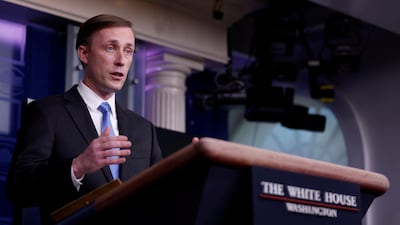White House National Security Adviser Jake Sullivan on Sunday said the US had begun to communicate with Tehran over its detention of American nationals.
Mr Sullivan said the matter was a “complete and utter outrage” and a “humanitarian catastrophe”.
Iran has arrested dozens of dual nationals, including several Americans, in recent years, mostly on espionage charges. Currently, there are four American and Iranian dual nationals held, Baquer and Siamak Namazi, Morad Tahbaz, and Emad Shargi.
Rights activists accuse Tehran of trying to use the detentions to win concessions from other countries, a charge it dismissed.
It was a “significant priority” of President Joe Biden’s administration to bring those Americans “safely back home”, Mr Sullivan told CBS.
“We have begun to communicate with the Iranians on this issue,” he said.
“We will not accept a long-term proposition where they continue to hold Americans in an unjust and unlawful manner.”
Iran's foreign ministry spokesman Saeed Khatibzadeh said messages from the Biden administration were received through the Swiss embassy in Tehran, historically the go-between for the two nations, that the new US admin is ready to address the issue. Mr Khatibzadeh said the foreign ministry responded via the same channel saying that that proposal put forward by the Foreign Minister in New York two years ago was still in place.
In a talk at the Asia Society in New York City in 2019 Mr Zarif said, “I put this offer on the table publicly now, exchange them, all these people that are in prison inside the United States, on an extradition request from the United States. We believe their charges are phony. The United States believes charges against these people in Iran are phony. Fine, let’s not discuss that. Let’s have an exchange. I am ready to do it and I have the authority to do it.” Mr Zarif did not make clear which Iranians imprisoned in the US he was asking to have released.
Mr Sullivan said Mr Biden was “determined” to prevent Iran from obtaining a nuclear weapon, and that diplomacy was the best way to do that.
Although tensions between the Trump Administration and the Iranian government were at an all-time high since the US pulled out of the nuclear accord a prisoner exchange was made in June of 2020. The United States allowed Majid Taheri to travel back to Iran as part of a swap. Michael White, an American who said he contracted the coronavirus while detained in Iran, was in turn freed by the Iranians.
The US said last week it was ready to talk to Iran about returning to the 2015 nuclear accord, abandoned by the Trump administration, that aimed to stop Tehran acquiring nuclear weapons, while lifting most international sanctions.
“Iran has not yet responded,” Mr Sullivan said.
The two countries have been at odds over who should take the first step to revive the deal.
Iran’s Foreign Ministry said on Sunday that the US would not be able to rejoin the nuclear pact until it lifted sanctions. Washington said Tehran must first return to compliance.
Mr Sullivan also said the US would respond to the SolarWinds cyber attack in “weeks, not months”.
The hack hit several government agencies last year and the US believes Moscow was behind it.
Mr Sullivan said the response would not simply consist of sanctions.
“We will ensure that Russia understands where the United States draws the line on this kind of activity,” he said.

